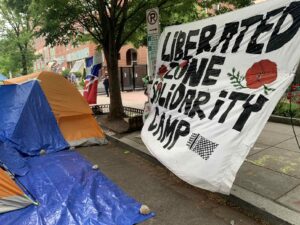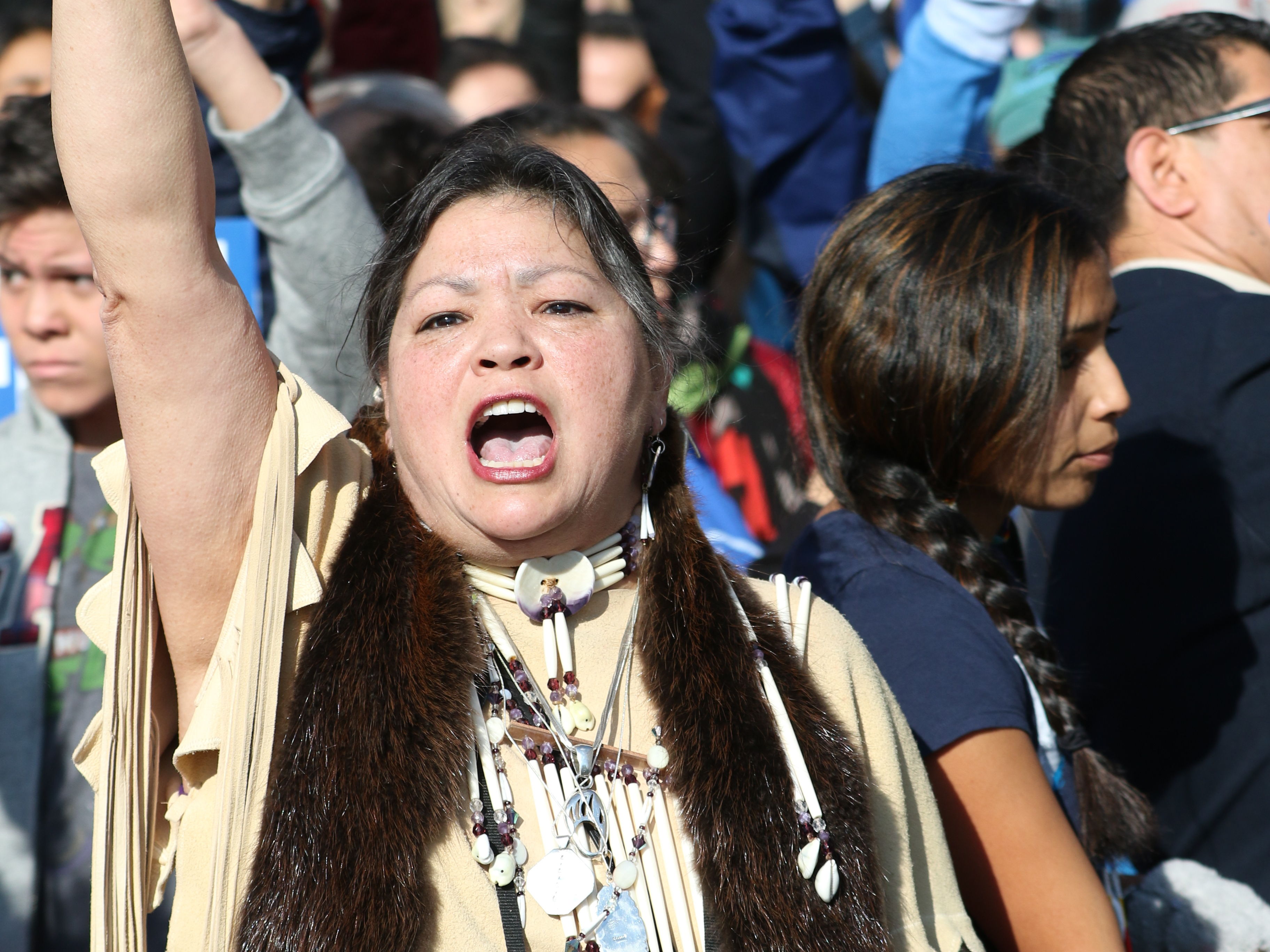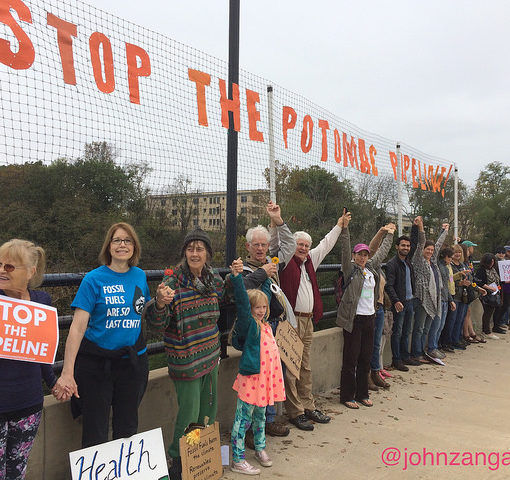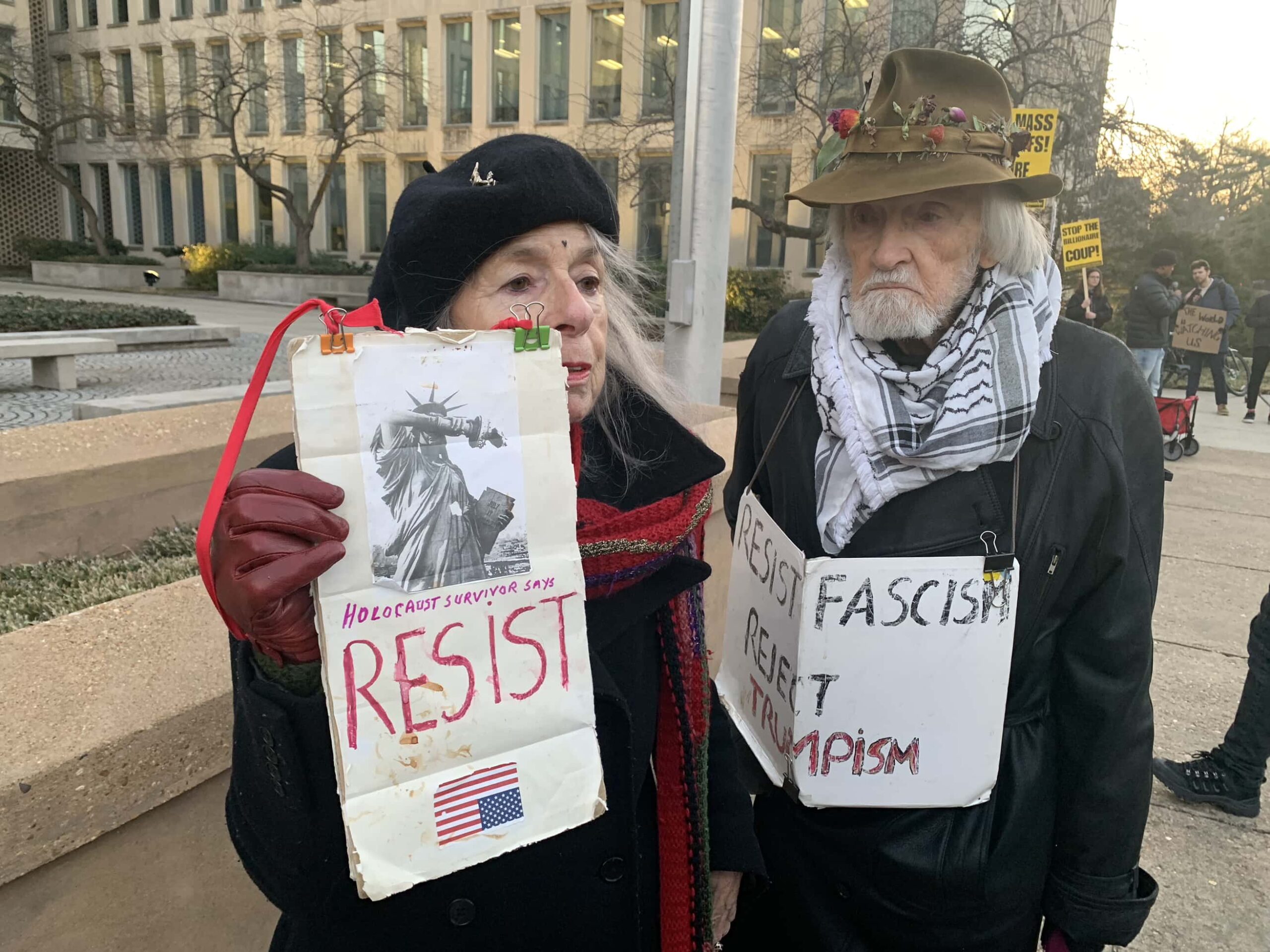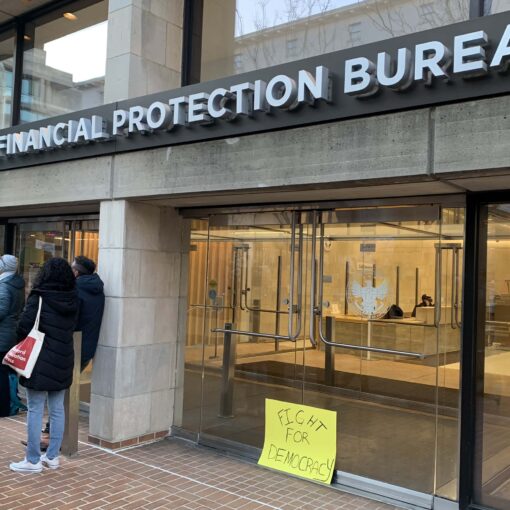Washington DC—George Washington University Students stormed back by the hundreds onto the campus streets on Thursday afternoon. They told of their experiences during a police raid the day before, and then set up a second temporary encampment of tents near the University President Ellen Granberg’s F Street Home. The student-led action came 36 hours after 32 were arrested during a predawn Wednesday morning raid on the U-Yard. The Press coverage was quarantined during the police take down of their U-Yard encampment so there is limited video of the raid. However, students described a disturbing sequence of events during the raid. Their individual stories paralleled a similar narrative of aggression, brutality, and violence from hundreds of police at the behest of the University Administration.
The Students’ fury was plain later on Thursday night after their rally as they again squared off against hundreds of police lining Street F Street and the adjacent campus streets. Students formed a human blockade, condemned the University Administration and violent police aggression, and chanted late into the night.
Their chants, roars, songs, and drums echoed from the homes and dormitories and could be heard for blocks away as they trolled University Administrators and police alike. Live streams sent their messages across social forums such as Tic Toc and Twitter. Their images were streamed as far as the embattled Gaza territory where a million Palestinians are still under siege from an continuing Israeli military attack.
One resident of the city of Ralah in Gaza who gave his name as Mahmoud, spoke to DCMG through an intermediary channel and interpreter, saying that the students had given him new hope and injected a sense among Gazans that something new was happening in the U.S. that could lead to an end of the bombing of his city. He said he had lost many family members and had given into despair in the days before the recent wave of students actions on U.S. University campuses captured attention in Gaza. (See video below of students’ direct action).
Second Student Direct Action Triggers Massive DC Police Response
On F Street the students’ action swelled as more learned of the impromptu encampment. Students named their second encampment “Shahada Square.” Meanwhile police began closing off the George Washington campus for several blocks surrounding the student action to reduce an influx of supporters from joining it. This cascading effect frustrated other students trying to return to their dormitories as well as guests staying at a nearby hotel not involved in the civil disobedience protest.
As the night wore on and tensions began to ease, the standoff relaxed a bit and the students’ actions evolved into dance and a celebratory mood. Later in the night a person was injured in a fall and police opened East F Street access at 19th Street to the student encampment, allowing some to leave the protest and others joined in. Some began to tire from the action which had by then lasted 6 hours.
Once again community support streamed into the new encampment from 19th Street as random vehicles delivered much needed water and food. Boxes of eye protection and breathing filters were sent by someone in support of the students in anticipation of police mobilization.
Students who were arrested during the Wednesday morning spoke during the earlier rally, reiterating their demands to University Administrators to divest from Israel and identify its sources of investment there.
The students’ version of events ran parallel on a theme that the University Administration had needlessly ordered a DC police assault of their peaceful encampment, wrongly disparaged their reputations as being anti-Semitic, and had not engaged them in a meaningful or good faith dialogue at any time during their two week occupation of U-Yard. The students iterated the elements of their creation of a peaceful encampment, inclusive to a diverse range to religions of which many came to pray in harmony with one another for peace in Gaza, for the safety of the Palestinian People, the successes of their camp, and their vision of a society where all races, creeds, and orientations are respected and included. They spoke of their collective accumulation and allocation among themselves and the community of knowledge, shelter, medical assistance, educational resources, and safety which they shared generously.
The students’ version of events at the encampment they built countered the University Administration narrative that they were dangerous, destructive, and engaged in activities offensive to the community. And they condemned the University president for disparaging them. They spoke of the betrayal and deep injuries they felt both emotionally from the University Administrators and physically from the police who brutalized them when no one was allowed close enough to witness it.
In no uncertain terms, the students condemned the early morning Wednesday police raid on their camp and decried the needless disposal into the trash of their equipment, including personal tents and belongings, medical supplies, a people’s library, food and supplies, which included laptops and study materials they were using for their final exams, and dozens of prayer mats used during Muslin services.
One student said that their computer equipment was in their tent during the raid and by being woken up in the early morning hours, they were disoriented and unable to retrieve their bedding, clothes, and belongings before they were taken away. They declined to give their name because the University had previously suspended other students involved in the U-Yard encampment.
The students said they may have been evicted from the camp but they were not leaving and by that they meant they would continue their solidarity to the Palestinian people and continue resisting the University’s financial support for those involved in the Gaza destruction and oppression of Palestinians. They would continue to rally for the Palestinian people even if it meant they could not continue with an encampment.
The students were not alone at their encampment. Several professors came out in support and and spoke about their distress in the way students had been treated during the eviction. They expressed worry that the University Administrators created an unhealthy academic environment by not being earnest and resourceful with the students in a dialogue to mitigate the grievances in a meaningful way. They declined to give their name for fear of retribution for supporting the students and their second encampment action.
Yet the students acknowledged their experience was but a shadow of the experiences of the residents of Rafah, Gaza, and those forced from their homes in the West Bank.
By 11:30 pm police began issuing warnings to leave the area or face arrest. Organizers decided to end the encampment. At just before midnight hundreds began marching again and a decision was passed among them to return home. Only one student photographer was arrested after the march ended but he was released without charges.
Voices of Some Students Arrested
Some of the students speeches are transcribed below as follows (They are included at the end of the video without personal exposure for privacy reasons).
Student Speaker 1:
“Over the past 13 days of our encampment I continued to think of the Palestinian children in Gaza who held signs for GW. Their eyes that were on the encampment gave us strength but our eyes are hyper focused on Gaza, Rafah, the West Bank, and all of Palestine.
“We built this liberated zone from the ground up. We imagined a world where public safety was not reliant on incarceration, policing, and surveillance. Where our art was made for us beyond the dictates of capitalist hierarchy, liberal governance, and commodified interests. We imagined a future that was made for the people and by the people and we materialized it.
“The Administration is terrified of the world we built—a world where food, shelter, medicine, art, and knowledge were collectively distributed—a world where our existence does not line the pockets of the ruling elite. And so they took that world away from us.
“I was one of the students whose own university arrested me. Before I was arrested I watched as these fascist pigs indiscriminately destroyed our art, our collectively accumulated resources, and our community infrastructure. It drives me (expletive) mad but this madness is the most rational thing that we can feel. The violence we faced is just an echo of the brutal destruction that Palestinians face every day.
“I was reminded of the homes that are bulldozed by zionist settlers in the West Bank and the entire neighborhoods that are decimated by U.S. funded rockets in Gaza. The Palestinians who have withstood far worse destruction on their homes and neighborhoods are our compass. Their resistance breathes life into ours. Their resistance provides us voice to sing in the holding cell and we will continue to sing when the zionist entity tries to silence us when we chant ‘we are not leaving.’ We don’t mean the physical space which we refuse to abandon. We mean the solitary we hold and embody with the Palestinian people.”
Student Speaker 2: This student is a disabled person and disability activist who was arrested in their wheelchair and stated they were improperly and unsafely harnessed while being transported.
“They thought they could get me alone, that they could put me in solitary, and they could intimidate me and i’m here to tell you that they (explicative) could not. We’re out here to say all eyes on Rafah and we are not backing down. We are here for Palestine.
“As a disabled person I center a lot of my activism on the ten principles of disability justice. And the two that I’m thinking about are cross-movement organizing and collective liberation. The ableist violence of the cops showcases the ways our struggles are connected and the ways our liberation is intertwined and also shows the importance and power of our solidarity. The fact that they needed to bring out 500 riot cops shows how scared they are of our power and we are not leaving.”
Speaker 3:
“They put our stuff in a (expletive) truck and destroyed it; tents, medical supplies, and food. They brutalized our students. They arrested (and) ppepper sprayed them. They felt that pepper spray for hours. And yet we are out here again because if you look at Rafah; if you look at Gaza, you know we have to be out here to continue the fight.”


